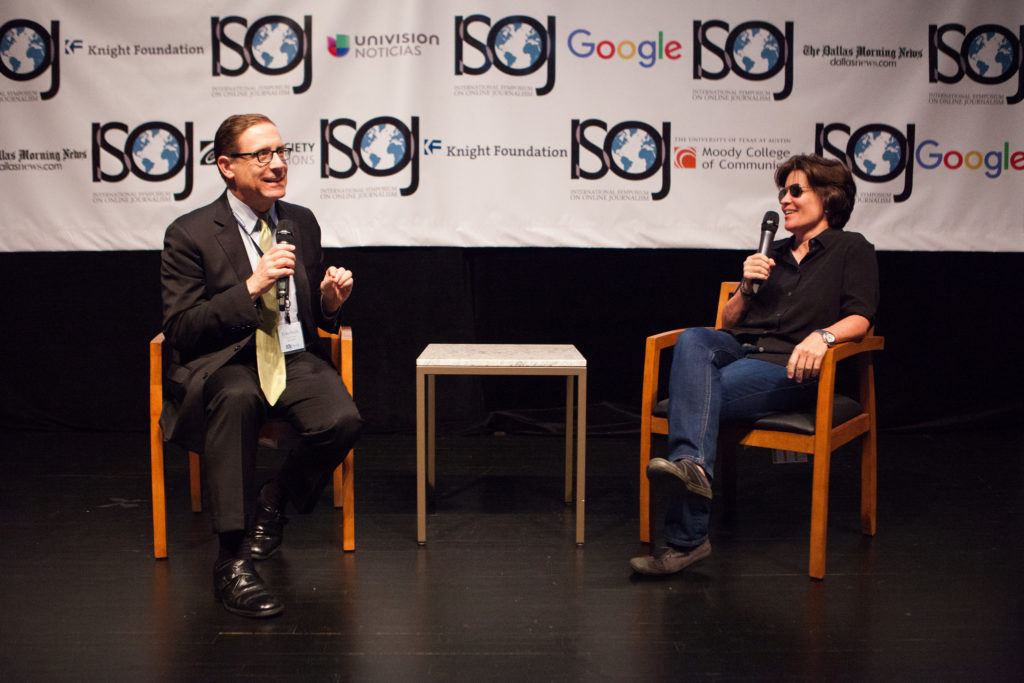April 16, 2016 | Mobile Journalism
No holding back of Re/code’s irrepressible Kara Swisher and her views on Silicon Valley and digital trends at ISOJ
Re/code co-founder and executive editor Kara Swisher offered her cutting analysis of Silicon Valley and the digital future in a wide-ranging and often hilariously profane address before the 17th International Symposium on Online Journalism (ISOJ) on Saturday, April 16.

Swisher has covered technology for decades and has been called Silicon Valley’s “most feared and well-liked” journalist. In 2014, Swisher and Wall Street Journal colleague Walt Mossberg launched the tech news website Re/code. Vox Mediabought Re/code in 2015, adding Swisher’s and Mossberg’s successful start-up to its roster of seven distinct online brands.
Before launching into her deliciously raucous presentation, the San Francisco-based Swisher took a swipe at the narcissistic nature of Silicon Valley millionaires and billionaires: “I would like them to stop talking about technology.”
Establishing an edgy humorous tone for her appearance at ISOJ, Swisher noted people don’t get up in the morning and thank the electricity grid for lights about to be turned on, or praise inventors of the automobile when they start their car. But in Silicon Valley, Internet people love to talk about their accomplishments and yet “most of them are really dull.”
In an address titled “Diary of a Mad Journalist (and Vaguely Gruntled Entrepreneur): How I Stopped Worrying and Learned to Love the Internet,” Swisher highlighted a variety of trends on the digital horizon.
Among those observations, Swisher was critical of BuzzFeed for its endless lists and “inane stories” but noted the operation is using data in interesting ways and journalists who dismiss BuzzFeed might learn something and do a better job of understanding data.
“Ubiquitous” — screens everywhere, all the time — is a trend that Swisher said is undoubtedly in our future, even though she mocked Google glasses as the only thing that can make models “unf***able.” The audience guffawed at that line, but her point was the glasses’ make the user react to it rather than the Google tool reacting to the user.
“Mobile is just the beginning of where this thing will go,” she said. It will be key, she added, to be aware of what people are doing and how “content” fits into the ubiquitous paradigm.
Swisher emphasized that brands are important. “We think a lot about everything we do. We have a brand and we stick to it.”
Geo-location and sensors are connected to commerce and content delivery because “nobody sits in front of a computer anymore.”
Swisher was adamant that being “genuine” cannot be avoided if one wants to have an impact online. Although she follows Kim Kardashian on Twitter, Swisher is not a fan but reminded the ISOJ gathering that the much-derided celebrity has 700 million social media followers so she must be doing something right.
“Always be transmitting” is another trend Swisher highlighted in an unconventional way, displaying a tweet posted by a man urinating in an airport washroom. Her point was that now, and even more so in the future, “there’s not a time when people do not share. It’s a constant transmission.”
She expects wearable technology to become “increasingly important.” Sensors will help people live a better life, perhaps admonishing a person for eating a doughnut for breakfast (like Swisher), then encouraging the consumption of healthy food.
Her list of trends continued (everything will be political) before Evan Smith, editor-in-chief, CEO and co-founder of The Texas Tribune, joined Swisher on stage for a Q&A on five major media entities.

First off, Smith asked, what about Google?
Google is still very powerful, Swisher started, but the search paradigm is waning which may explain the corporation’s development of the Android operation system and other products. In addition, co-founder Larry Page is, well, a unique individual: “Larry wants to get back on his rocket ship and go back to the planet Org,” she joked.
As for Apple, Swisher said CEO Tim Cook has done well after the death of the iconic Steve Jobs, and that he was the person who “kept the trains running on time” in the background behind the mercurial and brilliant Jobs.
Pressed by Smith for an opinion on the FBI’s insistence that Apple open up access to the iPhone owned by the couple who killed 14 people and wounded 22 in San Bernadino, Calif., Swisher said she was of two minds.
She understands the government’s need to acquire possibly sensitive information, but governments have always “overreached” and that is “dangerous” in the digital environment.
As for Facebook, Swisher respects Mark Zuckerberg, calling him “really innovative.”
Smith wasn’t satisfied, pushing for a response to whether Zuckerberg’s public brand is annoying.
“He’s less of a narcissist so that’s why I like him,” she replied, adding Zuckerberg is always challenging himself.
Smith then asked about Amazon.
Jeff Bezos is “a real tough customer,” Swisher replied, adding the founder of Amazon “has done more to transform the Internet economy than anyone else.”
Regarding Bezos’ purchase of The Washington Post from the Graham family, Swisher said the billionaire probably doesn’t mind losing a “small amount” to keep the revered publication in business.
Swisher, who started her career at The Post, had kind words for the Graham family, but said history has been too gentle on other families who ran profitable newspaper chains for decades.
“Generally, they are awful human beings.”
As for BuzzFeed, Smith and Swisher agreed that coverage of its revenue projection cut in half for 2016, from $500 million to $250 million, was overblown. Smith pointed out that $250 million in revenue would be welcome by many media organizations. Swisher added BuzzFeed has “done some amazing journalism” to complement the listicles and insanely popular GIFs.
“They celebrate their viralness and I think that irritates people” in the media business, said Swisher.
Smith remarked that the some media observers’ “end zone dance” over BuzzFeed’s drop in expected revenue doesn’t diminish its business model.
Swisher nodded approval and also took a broader view of online media, saying there has “never been a greater time for content,” including The New York Times which “has been really vibrant lately.”
The 17th ISOJ was held April 15-16 at the Blanton Museum of Art on the campus of the University of Texas at Austin. Video from both days can be found here in English, and here in Spanish.
The 18th annual ISOJ is scheduled for April 21-22, 2017, in Austin, Texas.
ISOJ 2016: Kara Swisher Q&A, from Knight Center on Vimeo.

